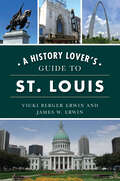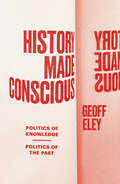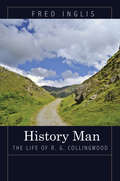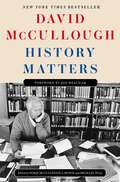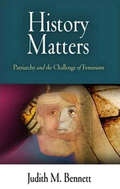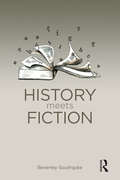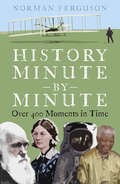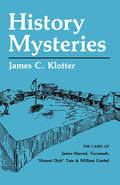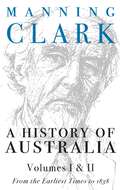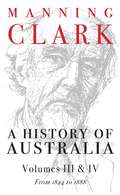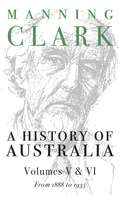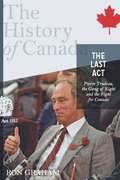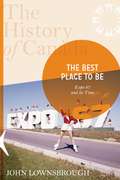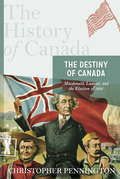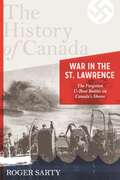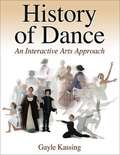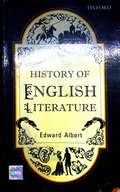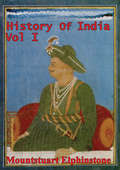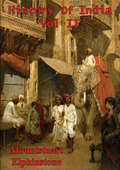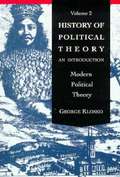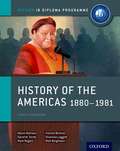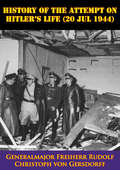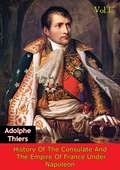- Table View
- List View
History Lover's Guide to St. Louis, A (History & Guide)
by Vicki Berger ErwinSt. Louis has so much to offer visitors and history lovers. Find prehistoric bone beds at Mastodon State Park or hum a tune at the National Blues Museum. Trace the path of westward expansion at the Gateway Arch National Park or see the Old Courthouse, wh
History Made Conscious: Politics of Knowledge, Politics of the Past
by Geoff EleyHow History has changed in the half-century since the 1960sDuring the last fifty years, the writing of history underwent two massive transformations. First, powered by Marxism and other materialist sociologies, the great social history wave instated the value of social explanation.Then, responding to new theoretical debates, the cultural turn upset many of those freshly earned certainties. Each challenge was profoundly informed by politics, from issues of class, gender, and race to those of identity, empire, and the postcolonial.The resulting controversies brought historians radically changed possibilities, expanding subject matters, unfamiliar approaches, greater openness to theory and other disciplines, a new place in the public culture. History Made Conscious offers snapshots of a discipline continuously rethinking its charge. How might we understand "the social" and "the cultural" together? How do we collaborate most fruitfully across disciplines? If we take theory seriously, how does that change what historians do? How should we think differently about politics?
History Man: The Life of R. G. Collingwood
by Fred InglisThis is the first biography of the last and greatest British idealist philosopher, R. G. Collingwood (1889-1943), a man who both thought and lived at full pitch. Best known today for his philosophies of history and art, Collingwood was also a historian, archaeologist, sailor, artist, and musician. A figure of enormous energy and ambition, he took as his subject nothing less than the whole of human endeavor, and he lived in the same way, seeking to experience the complete range of human passion. In this vivid and swiftly paced narrative, Fred Inglis tells the dramatic story of a remarkable life, from Collingwood's happy Lakeland childhood to his successes at Oxford, his archaeological digs as a renowned authority on Roman Britain, his solo sailing adventures in the English Channel, his long struggle with illness, and his sometimes turbulent romantic life. In a manner unheard of today, Collingwood attempted to gather all aspects of human thought into a single theory of practical experience, and he wrote sweeping accounts of history, art, science, politics, metaphysics, and archaeology, as well as a highly regarded autobiography. Above all, he dedicated his life to arguing that history--not science--is the only source of moral and political wisdom and self-knowledge. Linking the intellectual and personal sides of Collingwood's life, and providing a rich history of his milieu, History Man also assesses Collingwood's influence on generations of scholars after his death and the renewed recognition of his importance and interest today.
History Matters
by David McCulloughIn this posthumous collection of thought-provoking essays—many never published before—Pulitzer Prize–winning historian and bestselling author David McCullough affirms the value of history, how we can be guided by its lessons, and the enduring legacy of American ideals. <P><P> History Matters brings together selected essays by beloved historian David McCullough, some published here for the first time, written at different points over the course of his long career but all focused on the subject of his lifelong passion: the importance of history in understanding our present and future. <P><P> Edited by McCullough’s daughter, Dorie McCullough Lawson, and his longtime researcher, Michael Hill, History Matters is a tribute to a master historian and offers fresh insights into McCullough’s enduring interests and writing life. The book also features a foreword by Jon Meacham. <P><P> McCullough highlights the importance of character in political leaders, with Harry Truman and George Washington serving as exemplars of American values like optimism and determination. He shares his early influences, from the books he cherished in his youth to the people who mentored him. He also pays homage to those who inspired him, such as writer Paul Horgan and painter Thomas Eakins, illustrating the diverse influences on his writing as well as the influence of art. <P><P> Rich with McCullough’s signature grace, curiosity, and narrative gifts, these essays offer vital lessons in viewing history through the eyes of its participants, a perspective that McCullough believed was crucial to understanding the present as well as the past. History Matters is testament to McCullough’s legacy as one of the great storytellers of this nation’s history and of the lasting promise of American ideals. <P><P> <b>New York Times Bestseller</b>
History Matters
by Judith M. BennettWritten for everyone interested in women's and gender history, History Matters reaffirms the importance to feminist theory and activism of long-term historical perspectives. Judith M. Bennett, who has been commenting on developments in women's and gender history since the 1980s, argues that the achievement of a more feminist future relies on a rich, plausible, and well-informed knowledge of the past, and she asks her readers to consider what sorts of feminist history can best advance the struggles of the twenty-first century.Bennett takes as her central problem the growing chasm between feminism and history. Closely allied in the 1970s, each has now moved away from the other. Seeking to narrow this gap, Bennett proposes that feminist historians turn their attention to the intellectual challenges posed by the persistence of patriarchy. She posits a "patriarchal equilibrium" whereby, despite many changes in women's experiences over past centuries, women's status vis-à-vis that of men has remained remarkably unchanged. Although, for example, women today find employment in occupations unimaginable to medieval women, medieval and modern women have both encountered the same wage gap, earning on average only three-fourths of the wages earned by men. Bennett argues that the theoretical challenge posed by this patriarchal equilibrium will be best met by long-term historical perspectives that reach back well before the modern era. In chapters focused on women's work and lesbian sexuality, Bennett demonstrates the contemporary relevance of the distant past to feminist theory and politics. She concludes with a chapter that adds a new twist--the challenges of textbooks and classrooms--to viewing women's history from a distance and with feminist intent.A new manifesto, History Matters engages forthrightly with the challenges faced by feminist historians today. It argues for the radical potential of a history that is focused on feminist issues, aware of the distant past, attentive to continuities over time, and alert to the workings of patriarchal power.
History Meets Fiction (History: Concepts,Theories and Practice)
by Beverley C. SouthgateIs history factual, or just another form of fiction? Are there distinct boundaries between the two, or just extensive borderlands? How do novelists represent historians and history? The relationship between history and fiction has always been contentious and sometimes turbulent, not least because the two have traditionally been seen as mutually exclusive opposites. However, new hybrid forms of writing – from historical fiction to docudramas to fictionalised biographies – have led to the blurring of boundaries, and given rise to the claim that history itself is just another form of fiction. In his thought-provoking new book, Beverley Southgate untangles this knotty relationship, setting his discussion in a broad historical and philosophical context. Throughout, Southgate invokes a variety of writers to illuminate his arguments, from Dickens and Proust, through Virginia Woolf and Daphne du Maurier, to such contemporary novelists as Tim O’Brien, Penelope Lively, and Graham Swift. Anyone interested in the many meeting points between history and fiction will find this an engaging, accessible and stimulating read.
History Minute by Minute: Over 400 Moments in Time
by Norman FergusonAt what time was Guy Fawkes discovered underneath the Palace of Westminster? Just when was Einstein’s Theory of Relativity proved? What time was on the clock when Titanic sunk? When was President John F. Kennedy assassinated? All these questions and 400 more are answered in History Minute by Minute, breaking down history into a round-the-clock timeline of fascinating and vital moments from around the world. From battles and assassinations to crimes, deaths and disasters – and everything else that makes up our vivid and unique history – you will find that no minute lacks some significance. So, whether you want to find out what time an event happened or if anything noteworthy happened at the time of your birth, anniversary or the time on the clock right now, you are sure to delight in this quirky take on world history.
History Mysteries (New Books for New Readers)
by James C. KlotterFour true stories of unexplained deaths and disappearances from Kentucky&’s past. Historians are like detectives—and some historical events are like cold cases that haven&’t been solved yet. This concise, clearly written book presents the stories of four mysteries of Kentucky history: • The disappearance of James Harrod, who told his wife he was going hunting in 1792 and never returned • The unknown fate of &“Honest Dick&” Tate, the nineteenth-century Kentucky State Treasurer who ran off with a fortune in stolen funds • The battlefield death of Indian chief Tecumseh • The assassination of William Goebel, who died four days after being sworn in as governor In this enjoyable trip through the past, Kentucky State Historian James Klotter offers clues—but leaves the solutions to the reader.
History Of Australia (Volumes 1 & 2): From the Earliest Times to 1838
by Manning ClarkA History of Australia: From Earliest Times to 1838, deals with the pre-white settlement era and the earliest years of European colonisation through to the establishment of an increasingly settled society and the expeditions of the great inland explorers. This is not a general Australian history-it does not attempt to cover all aspects-and it is not a definitive or quantitative analysis. It is a work of art, a living and breathing account of the remaking of a primitive continent, history come alive.
History Of Australia (Volumes 3 & 4): From 1824 to 1888
by Manning ClarkManning Clark's six-volume history is one of the masterpieces of Australian writing. It is also one of the most passionately debated visions of Australian history, in which the struggle to realise an Australian nation is played out on an epic scale. A History of Australia: 1824-1888, takes the story of Australia through the momentous discovery of gold and the separation of Victoria from New South Wales, to the centenary of the coming of European civilisation to Australia on 26 January 1888. The story is one of destruction as well as construction-the destruction of the Aborigines and the construction of an essentially English bourgeois society and the taming of an alien and seemingly sterile land. This is not a general Australian history-it does not attempt to cover all aspects-and it is not a definitive or quantitative analysis. It is a work of art, a living and breathing account of the remaking of a primitive continent, history come alive.
History Of Australia (Volumes 5 & 6): From 1888 to 1945
by Manning ClarkManning Clark's six-volume history is one of the masterpieces of Australian writing. It is also one of the most passionately debated visions of Australian history, in which the struggle to realise an Australian nation is played out on an epic scale. A History of Australia: 1888-1945, covers Federation, the Boer War and World War I's Gallipoli. It finishes with the story of an emerging Australian identity at the point of its greatest trial-the outbreak of World War II. This is not a general Australian history-it does not attempt to cover all aspects-and it is not a definitive or quantitative analysis. It is a work of art, a living and breathing account of the remaking of a primitive continent, history come alive.
History Of Canada Series-the Last Act:pierre Trudeau,The
by Ron GrahamBetween the morning of Wednesday, November 4, and the morning of Thursday, November 5, 1981, a fateful drama unfolded that changed Canada forever. In one last attempt to renew the constitution with the consent of the provinces, Prime Minister Pierre Elliott Trudeau met behind closed doors in Ottawa with the ten premiers. It was the culmination of more than five decades of constitutional wrangling, and has been called the most important conference since the Fathers of Confederation got together in Quebec City in 1864. Faced with the threat of Quebec independence, the ambitions of Western Canada, and the provinces' demands for more power, Trudeau was embattled. But he was fiercely determined to make Canadians fully independent and to entrench a Charter of Rights and Freedoms. What happened that day still reverberates. It severed the last important link to Canada's colonial past. It guaranteed individual liberty and minority rights in the future. It weakened the grip of the elites and gave ownership of the constitution to Canadians. But it came at a price. Quebec alone refused to sign the final deal. René Lévesque, its separatist premier, claimed he had been betrayed by his allies in the Gang of Eight. The legend of the "Night of the Long Knives" took hold, precipitating a series of events that came close to destroying the country. Thirty years later, author Ron Graham delivers a gripping account of the fractious debates and secret negotiations. He uses newly uncovered documents and the candid recollections of many of the key participants to create a vivid record of that momentous twenty-four hours. Authoritative and engaging, The Last Act is a remarkable combination of scholarly research and historical narrative.
History Of Canada Series: The Best Place To Be,The
by John LownsbroughA pivotal event in Canada's history For six months in 1967, from late April until the end of October, Canada and its world's fair, Expo 67, became the focus of national and international attention in a way the country and its people had rarely experienced. Expo 67 crystallized the buoyant mood and newfound sense of confidence many felt during Canada's centennial. It becomes clearer, though, as its forty-fifth anniversary approaches in spring 2012, that Expo was something more than just a great world's fair. For many Canadians, it became a touchstone, a popular event that penetrated the collective psyche. The Best Place to Be takes a look at Expo and at the social and political contexts in which it occurred. It is above all a story of people: the young men and women who worked at Expo, the visitors, and the cameo appearances from the titled and celebrated, such as Elizabeth II, President Lyndon Johnson, President Charles de Gaulle (whose visit to Expo and Montreal became infamous), U.S. Senator Robert F. Kennedy, Jacqueline Kennedy, Princess Grace of Monaco, Princess Margaret, Marshall McLuhan, Sidney Poitier, Laurence Olivier, Cary Grant, Twiggy, and Pierre Trudeau.
History Of Canada Series: The Destiny Of Canada,The
by Christopher PenningtonIt was Sir John A. Macdonald's last campaign. His Conservatives had dominated Canadian politics since Confederation. Their National Policy, which protected Canadian manufacturers from foreign competition, was well established and affection for the "Old Man" was deep and widespread. The Liberal leader, Wilfrid Laurier, was new in the job and uncertain that a Roman Catholic from Quebec had any chance of winning votes outside his home province. But Macdonald's decision to hang Louis Riel had split the country, the economy was in the doldrums, and a movement in support of free trade with the United States gave the Liberals hope. In this richly textured narrative, Christopher Pennington spins a colourful tale of a country poised to make a momentous choice and of nineteenth century politics both at its most principled and at its most corrupt.
History Of Canada Series:war In The St. Lawrence,The
by Roger SartyFrom 1942 to 1944, 15 German submarines destroyed or severely damaged 27 ships, including three Canadian warships, a U.S. Army troop transport, and the Newfoundland ferry Caribou. More than 250 lives were lost. It was the only battle of the twentieth century to take place within Canada's boundaries, and the only battle to be fought almost exclusively by Canadian forces under Canadian, rather than alliance, high command. And for more than 40 years the battle was characterized as a Canadian defeat. But was it a defeat? Drawing on new material from wartime records--including ultra-top-secret Allied decryptions of German naval radio communications, Roger Sarty shows that Canada mounted a successful defence with far fewer resources and in the face of much greater challenges than previously known. He draws vivid pictures of the intense combat on Canada's shores and the interplay of the St Lawrence battle with war politics in Ottawa, Washington and London. At the same time, he weaves a second story: how researchers reassembled the scattered war records in Canada, Britain, the United States and Germany and brought the long-forgotten battle to life for new generations of Canadians and international audiences.
History Of Dance: An Interactive Arts Approach
by Gayle KassingHistory of Dance: An Interactive Arts Approach provides an in-depth look at dance from the dawn of time through the 20th century. Using an investigative approach, this book presents the who, what, when, where, why, and how of dance history in relation to other arts and to historical, political, and social events. In so doing, this text provides a number of ways to create, perceive, and respond to the history of dance through integrated arts and technology. This study of dancers, dances, and dance works within an interactive arts, culture, and technology environment is supported by the National Standards in dance, arts education, social studies, and technology education. History of Dance: An Interactive Arts Approach has four parts. Part I explains the tools used to capture dance from the past. Part II begins a chronological study of dance, beginning with its origins and moving through ancient civilizations and the Middle Ages through the Renaissance. Part III covers dance from the 17th to the 20th century, including dance at court, dance from court to theater, romantic to classical ballet, and dance in the United States. Part IV focuses on 20th-century American dance, highlighting influences on American ballet and modern dance as it emerged, matured, and evolved during that century.
History Of English Literature
by Edward AlbertThe fifth edition of Edward Albert’s History of English Literature, first published in 1979, offers its readers a detailed view of how English literature has evolved through the centuries. Starting from the Old English period to the literature of mid-twentieth century, the book takes a look at how English literature has developed across each period. It talks about the major literary genres of each age, like poetry, prose and drama, their major proponents and offers an extensive list of the notable works published during that period. Special focus has been given to Chaucer, Shakespeare, Milton, Pope and Dryden, whose writings strongly influenced the literary output of their time. Each chapter also contains quotes, together with translations wherever needed, from the many works cited in the text. The book also comes with a broad list of writings under ‘Suggestions for Further Reading’ to guide readers who want to further explore the subject.
History Of India Vol. I (History Of India #1)
by Mountstuart Elphinstone"Appointed through family influence to the East India Company, Mountstuart Elphinstone (1779-1859) arrived on the subcontinent in 1796, quickly learning Persian and developing an interest in Indian civilisation. After postings in Benares, Afghanistan and Poona, he became governor in 1819 of the recently acquired territory that became known as the Bombay Presidency, where he remained until his resignation in 1827. On his return to England, he devoted much of his time to writing and was a founder member of the Royal Geographical Society. This two-volume history, based on a range of Indian sources and first published in 1841, is infused with his lifelong understanding of Indian culture, science and philosophy. A scholarly refutation of James Mill's History, it was the most popular work of its kind among the early Victorian public. Volume 1 takes the history of the subcontinent up to the thirteenth century, while Volume 2 continues to the demise of the Mogul empire in the mid-eighteenth century."- Cambridge Library Collection
History Of India Vol. II (History Of India #2)
by Mountstuart Elphinstone"Appointed through family influence to the East India Company, Mountstuart Elphinstone (1779-1859) arrived on the subcontinent in 1796, quickly learning Persian and developing an interest in Indian civilisation. After postings in Benares, Afghanistan and Poona, he became governor in 1819 of the recently acquired territory that became known as the Bombay Presidency, where he remained until his resignation in 1827. On his return to England, he devoted much of his time to writing and was a founder member of the Royal Geographical Society. This two-volume history, based on a range of Indian sources and first published in 1841, is infused with his lifelong understanding of Indian culture, science and philosophy. A scholarly refutation of James Mill's History, it was the most popular work of its kind among the early Victorian public. Volume 1 takes the history of the subcontinent up to the thirteenth century, while Volume 2 continues to the demise of the Mogul empire in the mid-eighteenth century."- Cambridge Library Collection
History Of Political Theory An Introduction: Volume 2 Modern Political Theory
by George KloskoThe second volume of HISTORY OF POLITICAL THEORY provides an in-depth introduction to a select group of political thinkers. Professor Klosko weaves together excerpted materials with insightful commentary to create this thematically unified look at the central theoretical arguments of liberal political theory.
History Of The Americas, 1880-1981: IB History Course Book (Oxford IB Diploma Program )
by David Smith Yvonne Berliner Alexis Mamaux Mark Rogers Matt Borgmann Shannon Leggett<P>Drive critical, engaged, high level learning and skills. Developed with the IB, this Course Book equips learners to analyze and articulate complex historical concepts and contexts, strengthening performance and potential. Enabling advanced understanding, the student-centred approach actively builds, refines and perfects higher level skills. <P>- Cover the new syllabus in the right level of depth, with rich, thorough subject content from across the Americas for topics 10-17 for Paper 3 <P>- Developed directly the with IB for the new syllabus first examined 2017 <P>- Truly engage learners with topical, relevant material that convincingly connects learning with the modern, global world <P>- Streamline your planning, with a clear and thorough structure helping you logically progress through the syllabus <P>- Build the advanced-level skills learners need for Paper 3, with the student-led approach driving active skills development and strengthening exam performance <P>- Integrate Approaches to learning with ATLs like thinking, communication, research and social skills built directly into learning <P>- Help learners think critically about improving performance with extensive examiner insight and samples based on the latest exam format
History Of The Attempt On Hitler’s Life (20 Jul #1944)
by Generalmajor Freiherr Rudolf Christoph von GersdorffA short but gripping account of the personal experiences of German Army Officer Freiherr Rudolf Christoph von Gersdorff, one of the conspirators against Adolf Hitler. He was deeply involved in the German opposition to the Nazi Party, and carried out an unsuccessful bomb attempt on Hitler's life in 1943.
History Of The Consulate And The Empire Of France Under Napoleon Vol. I [Illustrated Edition] (History Of The Consulate And The Empire Of France Under Napoleon #1)
by Marie Joseph Louis Adolphe Thiers D. Forbes CampbellThe product of twenty years of laborious hard work, this is the definitive work on Napoleon and his times at the helm of the French Nation, written by no less than the first President of the Third Republic.Thiers moved in the highest circles of society and met with many of the surviving generals and statesmen of France and her opponents and wove their recollections into this monumental history. Filled with a particularly Gallic flavour without going into hero-worship, this multi-volume history has stood the test of time.This first volume begins with Napoleon’s 1797 campaign to his ascent to the consulate in 1800.Includes the Napoleonic Wars Map Pack with over 155 maps and plans following the military career of Napoleon.
